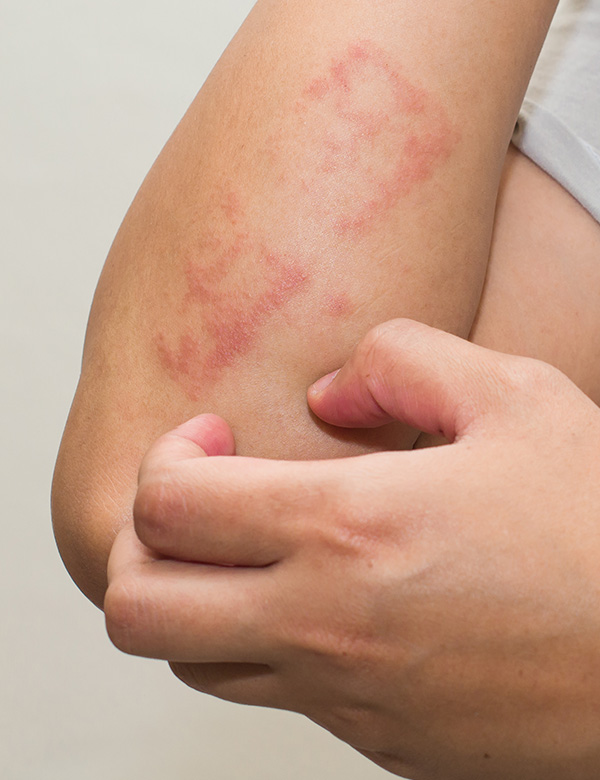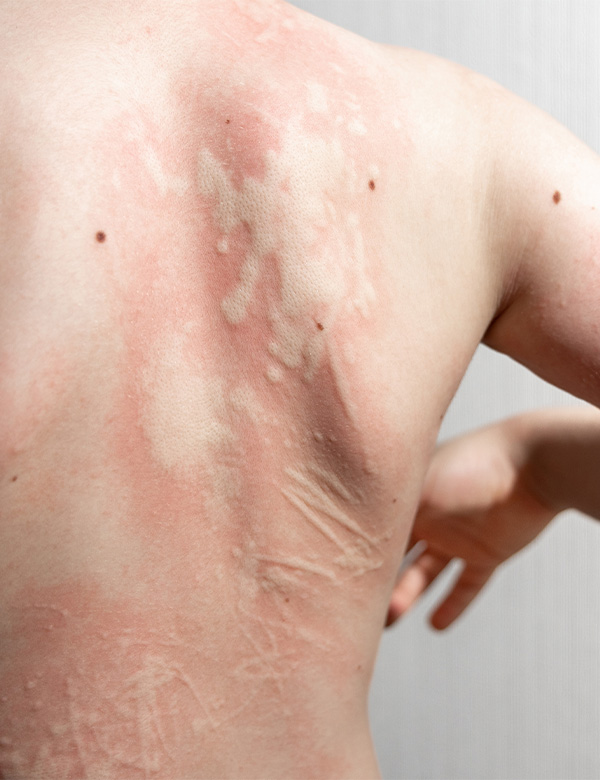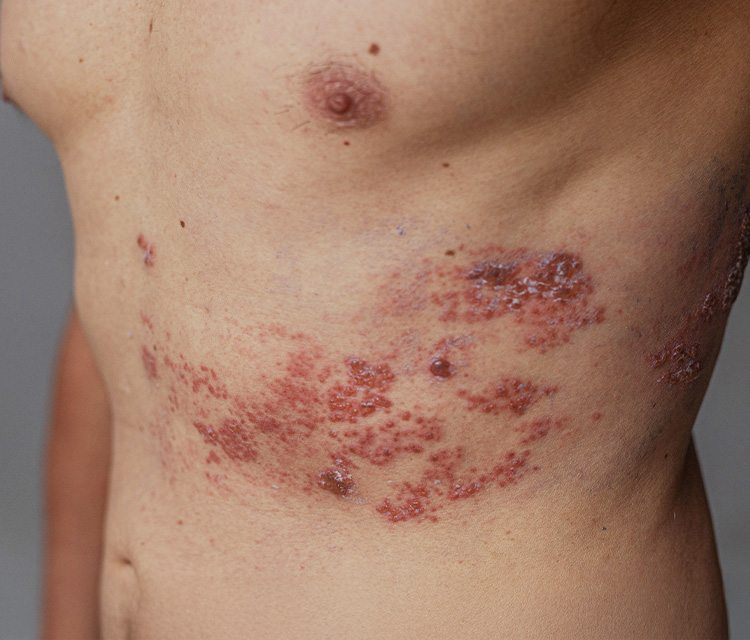Lupus erythematosus
Identifying and treating lupus on the skin – with an experienced dermatologist at the Derma Medical Clinic in Zurich – Sihlcity
Lupus erythematosus
Chronische Abszesse und schmerzhafte Knoten durch erfahrenen Hautarzt abklären und behandeln in der Derma Medical Clinic in Zürich - Sihlcity
Get a diagnosis and treatment for lupus, an autoimmune disease of the skin (which can also affect mucous membranes, joints or internal organs)
Examinations
Examination with a dermatoscope (skin magnifier)
Blood test
Skin sample if required
Procedure
Examination of skin, mouth and nasal mucosa
Blood draw
Discussion of findings
Duration
30 minutes
What is lupus?
Lupus – medically called lupus erythematosus – is an autoimmune disease where the immune system mistakenly attacks the body’s own cells.
There are different forms – from forms limited to the skin (like cutaneous lupus) to systemic lupus erythematosus (SLE), which may also affect the organs, joints or blood vessels.
Typical signs include red facial rashes (known as a “butterfly rash”), or rashes on the arms and hands, as well as increased sensitivity to sunlight.
The symptoms can appear gradually and vary: from mild skin changes to periods with fatigue, joint pain or fever.
An evaluation is recommended if you …
- regularly notice rashes on the face, arms or hands – especially after sun exposure
- experience persistent tiredness, fever or joint pain without a clear cause
- observe changes in the mouth or nose mucosa (e.g. painless sores)
- notice hair loss or increased sensitivity to sunlight
- already have an autoimmune disease or a family history of one
- want to rule out or confirm systemic lupus (SLE)

What is lupus?
Lupus – medically called lupus erythematosus – is an autoimmune disease where the immune system mistakenly attacks the body’s own cells.
There are different forms – from forms limited to the skin (like cutaneous lupus) to systemic lupus erythematosus (SLE), which may also affect the organs, joints or blood vessels.
Typical signs include red facial rashes (known as a “butterfly rash”), or rashes on the arms and hands, as well as increased sensitivity to sunlight.
The symptoms can appear gradually and vary: from mild skin changes to periods with fatigue, joint pain or fever.
Who should consider getting tested or treated for lupus?
An evaluation is recommended if you …
- regularly notice rashes on the face, arms or hands – especially after sun exposure
- experience persistent tiredness, fever or joint pain without a clear cause
- observe changes in the mouth or nose mucosa (e.g. painless sores)
- notice hair loss or increased sensitivity to sunlight
- already have an autoimmune disease or a family history of one
- want to rule out or confirm systemic lupus (SLE)
Treatment
The process starts with a detailed skin examination. In case of visible skin changes, inspection is done carefully, often followed by a blood test.
For unclear symptoms, a small skin sample may be taken to confirm the diagnosis. If there’s a suspicion of organ involvement, we work with other medical specialties.
How is lupus treated?
Treatment depends on how severe it is and which areas of the body are affected. Often, anti-inflammatory creams or corticosteroid ointments are used.
If symptoms are more severe – such as joint pain or organ involvement – tablets may be prescribed. Plus, consistent sun protection is essential to reduce flare-ups.
How does lupus treatment work?
Initial consultation
We’ll talk with you about your symptoms, medical history and possible triggers.
Skin examination
We’ll carefully check the affected skin and mucous membrane areas – using a dermatoscope if needed.
Blood test
We’ll take a blood sample for further testing.
Skin sample
If needed, we’ll take a small skin sample to confirm the diagnosis.
Treatment planning
We’ll review the results with you and put together a treatment plan.
Ongoing support
If needed, we coordinate additional assessments or referrals – for example, in case of organ involvement.

At Derma Medical Clinic, treatment for lupus is provided exclusively by experienced dermatology specialists:
- Dr. Benjamin Miller, dermatologist and phlebologist
- Dr. Markus Dendorfer, dermatologist with a focus in pediatric dermatology
Both have many years of experience in the diagnosis and treatment of chronic inflammatory skin diseases.

Dr. med. Markus Dendorfer
Board-certified Specialist in Dermatology & Venereology FMH

Dr. med. Benjamin Miller
Board-certified Specialist in Dermatology & Venereology FMH
What to expect from us
Thorough evaluation
Your exam takes place in a calm setting – with time for your questions and concerns. If needed, we take a small skin sample for closer analysis.
Tailored treatment
Depending on symptoms, we treat with creams, tablets or sun protection. Treatment is tailored to your skin, mucous membranes and any organ involvement.
Team-based care
If systemic lupus is suspected, we involve other specialists – such as rheumatology or internal medicine – as needed.
Everything in one place
You receive diagnosis, medical care and cosmetic support all in one place. That means consistent contacts, short paths and coordinated care – from first examination through follow-up.
Are you dealing with recurring rashes, sensitivity to sunlight or unclear symptoms like fatigue or joint pain?
Book an appointment now for a lupus evaluation at Derma Medical Clinic in Zurich – Sihlcity.
FAQ – Frequently asked questions about lupus
What is lupus erythematosus?
Lupus erythematosus is a chronic, inflammatory autoimmune disease. The immune system attacks the body’s own cells – especially in the skin, joints, blood vessels or internal organs. There are different forms, like cutaneous lupus and systemic lupus erythematosus (SLE).
What are common symptoms of lupus?
Symptoms can vary a lot. Common signs include:
- Persistent fatigue and tiredness
- Joint and muscle pain
- Butterfly-shaped rash on the face
- Sensitivity to sunlight
- Fever without a clear reason
- For systemic lupus: possible involvement of kidneys, heart or lungs
Is lupus contagious?
No – lupus is not contagious. It’s an autoimmune disease caused by a problem with the immune system. It does not spread through viruses, bacteria or physical contact.
How is lupus diagnosed?
Doctors diagnose lupus based on your symptoms, blood tests (e.g. autoantibodies like ANA) and – in case of skin changes – a small skin sample. For systemic lupus, dermatologists, rheumatologists and general practitioners often work together.
How is lupus treated?
Treatment depends on the form and severity. Common treatments include:
- Anti-inflammatory medications
- Immune-suppressing medications
- Hydroxychloroquine (especially for skin and joint issues)
- Corticosteroids during flare-ups
The goal is to control inflammation, prevent flare-ups and protect organs.
What’s the difference between skin lupus and systemic lupus?
Skin lupus (e.g. cutaneous lupus erythematosus) mostly affects the skin and causes rashes or light sensitivity. Systemic lupus erythematosus (SLE) may also affect internal organs and requires more intensive treatment.
How does lupus progress?
Lupus usually progresses in phases – symptoms may get worse for a time, then calm down again. The course varies for each person. With the right treatment, it can be well managed.
What can trigger a lupus flare-up?
Common triggers include:
- UV light (e.g. from sunlight)
- Physical or emotional stress
- Infections
- Certain medications
Consistent sun protection and good medical care can reduce flare-ups.




